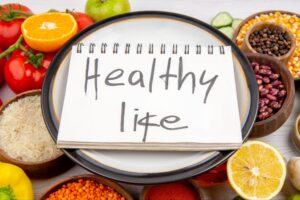Heart Health: 5 Best Foods to Lower Bad Cholesterol
Maintaining heart health is crucial for a long and active life. One of the most important factors in heart health is controlling cholesterol levels, especially low-density lipoprotein (LDL) cholesterol, often referred to as “bad” cholesterol. High levels of LDL cholesterol can build up plaque in the arteries, increasing the risk of heart disease and stroke. Fortunately, dietary choices play an important role in controlling cholesterol levels. Here, we explore the top five foods to help lower bad cholesterol and promote a healthy heart.
1. Oats and Barley
Oats and barley are the most effective foods for lowering LDL cholesterol, thanks to their high amount of soluble fiber, especially beta-glucan. Soluble fiber reduces the absorption of cholesterol into your bloodstream. Just 3 grams of soluble fiber per day can lower total cholesterol by 5 to 10 percent.
How to Incorporate:
- Oats: Start your day with a bowl of oatmeal or add oat bran to your smoothies and baked goods.
- Barley: Use barley in soups, stews, or as a rice substitute in salads and pilafs.
2. Fatty Fish
Fatty fish such as salmon, mackerel and sardines are rich in omega-3 fatty acids. These healthy fats have been shown to lower triglycerides, reduce inflammation, and increase high-density lipoprotein (HDL) cholesterol, which helps remove LDL cholesterol from the bloodstream.
How to Incorporate:
- Aim to eat at least two servings of fatty fish per week. Grill, bake, or broil the fish to keep it heart-healthy.
- Try adding canned sardines or mackerel to salads, or use them as a protein-packed topping for whole-grain crackers.
3. Nuts and Seeds
Nuts and seeds, such as almonds, walnuts, flaxseeds and chia seeds, are excellent sources of unsaturated fats, fiber and plant sterols. These nutrients help lower LDL cholesterol levels and improve overall heart health.
How to Incorporate:
- Almonds and Walnuts: Enjoy a handful as a snack, add them to your morning cereal, or sprinkle them over salads.
- Flaxseeds and Chia Seeds: Mix ground flaxseeds into smoothies, yogurt, or oatmeal. Add chia seeds to water for a refreshing drink or use them as an egg substitute in baking.
4. Legumes
Legumes, including beans, lentils and chickpeas, are rich in soluble fiber and protein, but low in fat. They help reduce cholesterol by binding to bile acids in the intestines, which are then excreted from the body. This process forces the liver to use more cholesterol to make new bile acids, thereby lowering blood cholesterol levels.
How to Incorporate:
- Add beans to soups, stews, salads, or make a hearty bean chili.
- Use lentils as a base for salads or incorporate them into meatless burgers and stews.
- Chickpeas can be roasted for a crunchy snack, blended into hummus, or added to salads.
5. Fruits and Vegetables
Fruits and vegetables are rich in soluble fiber, antioxidants, and plant compounds called sterols and stanols, which inhibit cholesterol absorption in the digestive tract. Fruits such as apples, grapes, strawberries and citrus fruits, as well as vegetables such as okra and eggplant are particularly effective.
How to Incorporate:
- Enjoy fruits as a snack or dessert. Add them to your breakfast cereal or yogurt.
- Include a variety of vegetables in your meals. Steamed, roasted, or raw, they are versatile and can be added to almost any dish.
- Make smoothies with a mix of fruits and vegetables to maximize your intake of cholesterol-lowering nutrients.
Additional Tips for Lowering Cholesterol
1. Choose Healthy Fats: Replace saturated fats found in red meat and full-fat dairy products with healthier fats like those found in olive oil, avocados, and nuts. This swap can help reduce LDL cholesterol levels.
2. Increase Physical Activity: Regular exercise can help raise HDL cholesterol while lowering LDL cholesterol and triglycerides. Aim for at least 30 minutes of moderate-intensity exercise most days of the week.
3. Maintain a Healthy Weight: Losing excess weight can improve cholesterol levels. Even a small amount of weight loss can have a significant impact on LDL cholesterol.
4. Limit Dietary Cholesterol: Reduce your intake of foods high in dietary cholesterol, such as organ meats, shellfish, and full-fat dairy products.
5. Avoid Trans Fats: Trans fats, often found in fried and commercially baked products, are particularly harmful to cholesterol levels. Check food labels for partially hydrogenated oils and avoid these products.
Conclusion
Controlling your cholesterol levels is an important component of heart health. By including these five foods in your diet—oats and barley, fatty fish, nuts and seeds, legumes, and fruits and vegetables—you can significantly lower your LDL cholesterol and improve your overall cardiovascular health. In addition to these dietary changes, adopting a healthy lifestyle that includes regular physical activity, maintaining a healthy weight and avoiding harmful fats will further support your heart health. Remember, small changes can make a big difference, so start today and take proactive steps toward a healthier heart.

Weight Loss Exercises at Home
INTRODUCTION In today’s fast-paced world, finding time to go to the gym can be challenging. However, that doesn’t mean you can’t achieve your fitness

Healthy Lifestyle Tips: A Comprehensive Guide to Better Living
INTRODUCTION Living a healthy lifestyle is more than just a trend; it’s a commitment to improving your overall well-being and longevity. With the rise of

The Stark Reality of Work Depression and Death in India
INTRODUCTION Job depression is a silent epidemic that is sweeping many parts of the world and India is no exception. The modern work environment, economic

The Milestone of Modern Medicine: The First Successful Human Head Transplant
INDRODUCTION In the ever-evolving field of medical science, breakthrough achievements constantly reshape our understanding of what is possible. One of the most amazing and controversial

How to Boost Your Brain Power: Proven Strategies for Mental Clarity and Focus
INTRODUCTION In today’s fast-paced world, maintaining optimal brain health is more important than ever. Whether you’re a student cramming for exams, a professional juggling multiple

The Ultimate Guide to an Effective Skin Care Routine At Home
INDRODUCTION In the pursuit of glowing and healthy skin, an effective skin care routine is paramount. With the plethora of products and advice available, understanding
